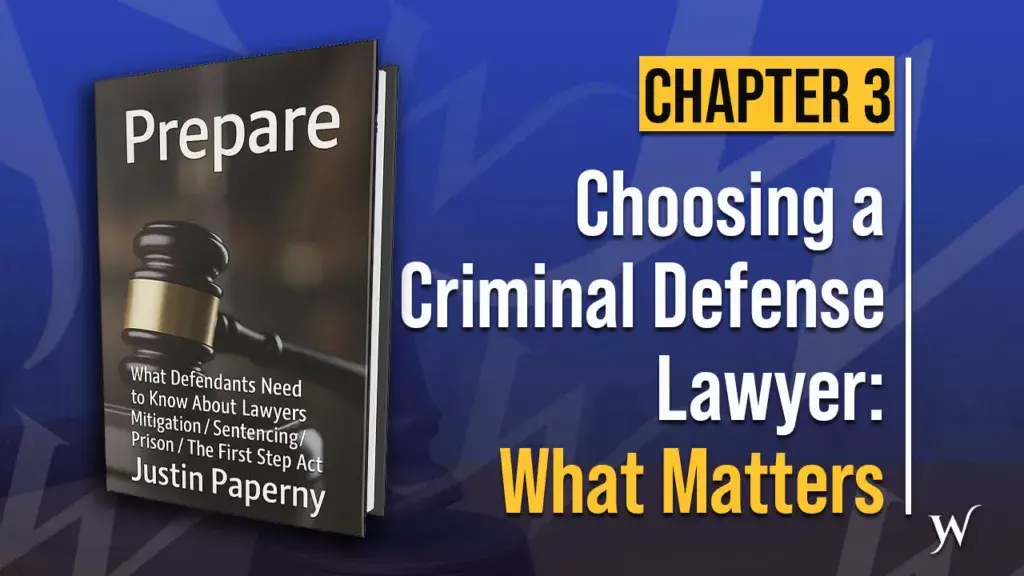Table of Contents
How to Choose the Right White-Collar Defense Attorney
Most people entering the system have never hired a lawyer, let alone one suited for a federal investigation. This chapter explains how to choose the right white-collar defense lawyer, why jurisdiction matters, what public defenders can and cannot provide, how fee structures work, and why early preparation improves decisions. Hiring counsel is important, but defendants also have to learn the system, share accurate information, and prepare for sentencing and what follows.
When I learned I was in trouble, I did not know how to hire or evaluate a white-collar defense lawyer. I had never been in the system, nor had I supported anyone who was. This chapter outlines what I wish I had known at the start.
In Chapter 1, we covered how complicated white-collar cases can become. Multiple statutes, procedures, and agencies can come into play. Without the right white-collar defense lawyer, people often say or do things that create additional problems. Even lawyers hire their own lawyers when they expect scrutiny from the government.
Why Expertise Matters When Selecting a White-Collar Defense Lawyer

The legal system is broad, and attorneys specialize for good reason. A lawyer who focuses on taxation may know the tax code well but may have limited experience with federal criminal procedure. Similarly, a lawyer who handles federal sentencing may not be suited to negotiate a severance agreement.
Hiring the right expert is essential.
Civil vs. Criminal Questions
If someone hears from regulators such as the SEC or FTC, a civil investigation may be underway. Civil inquiries can turn criminal, so early guidance matters.
Authoritative reference:
If questions come from the FBI or DEA, a criminal investigation is likely active. Whether civil or criminal, that is the point when research on lawyers should begin.
People often call a lawyer friend for quick advice. A business lawyer may know more than the average person, but without subject-matter expertise, that advice can be incomplete. It is better to ask that friend for a referral to someone who works in the right area.
When charges are filed, the ambiguity ends. A misdemeanor in state court requires different experience than a federal fraud indictment. Jurisdiction and subject-matter specialization should guide decisions.
Understanding Jurisdictions and Licensing
Every state has a bar association that issues licenses and monitors conduct. To become licensed, a lawyer must:
- Graduate from an ABA-accredited law school
- Pass the state bar exam
- Meet character requirements set by the bar
Courts may require additional training or admission before allowing a lawyer to appear.
How Jurisdiction Shapes Outcomes
Each state has its own criminal code, trial courts, appellate courts, and a high court. The federal system operates separately, with:
- 94 district courts
- 13 circuit courts
- The U.S. Supreme Court at the top
Reference:
A lawyer may excel in a California state courtroom but know little about federal sentencing guidelines. When hiring a white-collar defense lawyer, make sure the lawyer has experience in the jurisdiction where the case exists.
Public Defenders and Assigned Counsel
In Gideon v. Wainwright (1963), the Supreme Court held that anyone facing serious charges has a constitutional right to counsel. When a defendant cannot afford a lawyer, courts appoint one.
Financial statements determine eligibility. A person does not have to be destitute; the court simply needs to find that paying for counsel is not feasible.
Public defenders often carry heavy caseloads but tend to be highly trained. They typically work on specific case types in specific courts and may provide strong representation.
However, defendants do not get to choose appointed counsel. Once a public defender is assigned, the defendant should help the lawyer understand the facts, context, and documents that matter.
What to Expect When Retaining Private Counsel
Hiring a private lawyer requires planning for cost. Rates vary widely depending on jurisdiction, experience, and reputation. Some lawyers charge less than $200 per hour; others charge more than $2,000.
In major cities—New York, Washington DC, San Francisco—rates tend to be higher. Regardless of rate, hiring counsel is a significant financial commitment.
Lawyers must review all evidence, including materials relating to co-defendants, wiretaps, digital files, transcripts, and statements. Even a straightforward case can require extensive preparation.
Lawyers also review case law, rules, and procedures that go beyond the specific charges. Some matters require investigators or witness interviews. These hours add up.
Before hiring a lawyer, defendants should realistically assess their resources and the expected duration of the case.
Free consultations may offer initial guidance, but defending a case requires paid time and thorough review.
Retainer Agreements and Conflicts
Courts may restrict lawyers from withdrawing once they accept a case. For this reason, lawyers tend to screen clients carefully.
A retainer agreement usually outlines:
- Hourly rates for partners, associates, paralegals, and investigators
- Required funds to be deposited into a trust account
- Billing cycles and replenishment expectations
Lawyers bill against the retainer and transfer earned fees into their operating account. Some require monthly replenishment.
Understanding the agreement upfront prevents disputes later.
Plea Agreements and Strategic Considerations
Every defendant has the right to plead not guilty and proceed to trial. However, trials are costly, and losing at trial often leads to higher sanctions.
Most federal cases resolve through plea agreements. Prosecutors may offer concessions in exchange for a guilty plea, reducing potential exposure.
Defense lawyers may negotiate aggressively or may prefer early discussions, depending on strategy. Every case is different, and defendants should rely on their lawyer’s experience while educating themselves about:
- Sentencing
- Sanctions that follow conviction
- The federal prison system
- Early release mechanisms
- Post-prison opportunities
Hiring counsel does not eliminate the work a defendant must do. A lawyer makes legal decisions, but the defendant must still build a new record and learn about the system.
How to Evaluate a White-Collar Defense Lawyer
Evaluating a white-collar defense lawyer requires due diligence. Consider:
- Fee structure: hourly or flat fee
- Authenticity of reviews
- Experience with fraud or regulatory cases
- Approach to sentencing mitigation
- Availability to answer questions
- Willingness to explain exposure and strategy
Schedule a call with our team to get started.
Thank you,
Justin Paperny is an ethics and compliance speaker and founder of White Collar Advice, a national crisis management firm that prepares individuals and companies for government investigations, sentencing, and prison. He is the author of Lessons From Prison, Ethics in Motion, and the upcoming After the Fall. His work has been featured on Dr. Phil, Netflix, CNN, CNBC, Fox News, The Washington Post, and The New York Times.
FAQ
What does a white-collar defense lawyer handle?
Financial, regulatory, and fraud-related cases in federal or state court.
When should I hire a lawyer?
As soon as investigators or regulators begin asking questions.
Do civil inquiries matter?
Yes. Civil investigations often become criminal.
Are public defenders effective?
Many are highly trained but carry heavy caseloads.
How much do defense lawyers cost?
Rates range from under $200 to over $2,000 per hour depending on experience and jurisdiction.
What should I ask a prospective lawyer?
About fees, experience, communication style, and sentencing mitigation.
Why is jurisdiction important?
State and federal courts have different procedures and sentencing systems.
Do most federal cases go to trial?
No. Most resolve with plea agreements.
How long does preparation take?
Hundreds of hours in complex cases.
Can a lawyer withdraw from a case?
Not always; courts may restrict withdrawal.
What should I bring to the first meeting?
Documents, timelines, and clear information about your conduct.
Should I rely on a lawyer friend for advice?
Only for referrals—subject-matter expertise matters.




